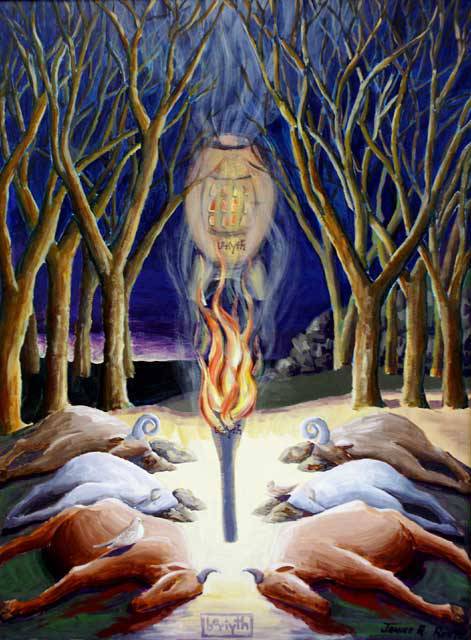In this is love, not that we have loved God but that He loved us and sent His Son to the the propitiation for our sins. --1 John 4:10
How can we describe the love of God? It's hard to describe in the current age of cheap grace. We grew up reciting John 3:16, "For God so loved the world..." but our attention span is so short that we stop reading before we get to the part about "whosoever believes in Him." The part that sticks in our mind is that God loves the whole world. That means He loves everyone, right? Meanwhile the world has redefined the word "love" to mean universal tolerance and acceptance no matter what. Hey, we're all sinners, right? Christ died for the sins of the world, right? So we can keep on sinning, right?
We never talk about what God hates.
- Psalm 5:5 says God hates the workers of iniquity.
- Psalm 11:5 says God hates the wicked.
- Proverbs 15:8 says God hates the sacrifices of the wicked.
- Proverbs 15:9 says God hates the ways of the wicked.
- Proverbs 15:26 says God hates the thoughts of the wicked.
In response, God did something incredible: He cut a covenant with Abraham. Now, cutting a covenant was an ancient ritual in which someone quite literally cut a series of animal carcasses in half and then walked through the midst of them, as if to say, “May what happened to these beasts befall me as well, should I ever break my faithfulness to you.” We see an example of this in Jeremiah 34:18, which says, "And the men who transgressed my covenant and did not keep the terms of the covenant that they made before me, I will make them like the calf that they cut in two and passed between its parts."He (God) said to him (Abraham), "Bring me a heifer three years old, a female goat three years old, a ram three years old, a turtledove, and a young pigeon." And he brought Him all these, cut them in half, and laid each half over against the other. --Genesis 15:9-10
But in the story of Abraham’s covenant, it isn’t Abraham who walks between the beasts, is it? Abraham doesn’t say, “May I be killed if I break my promises to God.” No! Amazingly, it is the Spirit of God who passes through the bisected animals. God cuts the covenant, not Abraham. In the midst of a darkness most terrible, the fire of God appears and proclaims, not in words but in deed, “I will be with you. I will be faithful to you. And I will keep every single one of My promises to you, and yet more than these, even if it kills Me.” God here promises, brothers and sisters, to be faithful to us even unto death—not simply our death, but His own. Faithful to this covenant, faithful to this relationship, even if it kills Him. Faithful to us, even if we kill Him.
Imagine the Source of All Being, the One True God Most High, who created and sustains all things in the entirety of existence, proclaiming aloud, “I love this silly old man whom I have made so much that I will lay down everything I am and everything I have just to love him, to abide with him, to be faithful to him forever.” It’s insane. When we talk about being heirs of Abraham, my brothers and sisters, this is what we’re talking about. Not the bloodlines of Isaac and Ishmael, but a promise so powerful that the very Author of Life would lay down His own Life out of love for us. (https://rdgstout.blogspot.com/2016/02/cutting-covenant.html)
When I was in college I wrote some pretty bad poetry trying to express in words the love that God has for us. Thinking of an old Southern expression, "I just love him/her to death!" I wrote these words:
Jesus I love You, my Savior and Friend.
You loved me to death, but that wasn't the end;
The same power that raised You still conquers sin.
And Jesus I love you again and again.
The musical group Glad wrote it much better:
And this is Love
Not that I have first loved You
And this is Love
That You have first loved me
And You give up Your life
One perfect sacrifice
And this is Love
That You have first loved me
You did not wait for me
To make myself a worthy man
You did not wait for me
To make a good and righteous stand
For there was nothing I could do
In sin I had died
Yet Your love conquered death
And raised me to Your side
Like the story in Genesis, the Gospel of John also talks about the Word of God made manifest in the flesh. "In Him was life, and the life was the light of men. The light shines in the darkness, and the darkness has not overcome it." (John 1:4-5) Like the torch that pierced the darkness in Genesis 15, passing through death to seal the covenant with the man who would later be called Abraham, Jesus was the light of life that passed through death to seal the covenant of love to all who believe. We deserve death and hell, but like Abraham, when we believe, our faith is counted as His righteousness.
Now that's what I call love.

Blynn, thank you for that beautiful explanation..this is the first, that I have understood this illustration, in Genesis i
ReplyDelete